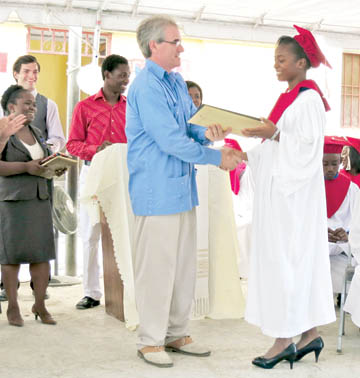
DUBUQUE—Deacon Patrick Moynihan’s almost-20 years of on-the-ground experience as president of The Haitian Project and head of Louverture Cleary School in Port-au-Prince, Haiti, has him cheering for Bishop Launay Saturne of Jacmel’s visionary words about what can make a concrete, long-term difference for Haiti.
A recent Catholic News Service story by Dennis Sadowski notes that Bishop Saturne “wants to build partnerships between Catholic parishes in other countries and Catholic schools in his diocese — modeled on the medical missions that many parishes in developed nations already have established in Haiti.”
The bishop also said that only by strengthening the educational system will Haiti begin to overcome the stranglehold poverty has on the vast majority of the country’s 10 million inhabitants. “We need direct help. We’re not asking for money. But we want people to come and get involved because the children cannot learn. The teachers are not being paid. The schools are in bad shape,” Bishop Saturne said.
“We need the type of help that builds our capacity,” he continued. “Without education we will remain in the current situation until the end of time.”
Moynihan — whose ties to the Diocese of Rockford include several years as a deacon at Holy Family Parish in Rockford and in the diocesan Office of the Diaconate — says, “It’s (taken) a long time for the bishops in Haiti to say what they need instead of just taking what is given them.
“We need to listen to (them as) local actors and (acknowledge) their responsibility to make decisions at the local level.”
Unless the overall vision of what Haiti needs changes to focus on education, particularly on teaching students how to create an infrastructure for the society, “We’ll be in poverty forever,” Moynihan says, strongly recommending that donors and volunteers “work through existing structures, including the Catholic Church, and support the structural flow of development.”
Having the local bishop “plugged into what you’re doing (in Haiti), you will be participating in an overall plan instead of an individual reach-out,” he says, adding that Bishop Saturne “is clearing asking (parishes) to help us develop our school system.”
“Haiti’s schools are a far cry from those of neighboring Dominican Republic, let alone those of more developed countries: Textbooks and basic supplies are hard to come by; few teachers have more than a ninth-grade education; buildings are in need of repair; equipment is virtually nil,” says Sadowski’s article, which adds that Bishop Saturne sees also education as a way to strengthen the Catholic Church.
“To evangelize I have to do it through reinforcement of the human spirit. For me to do so, I have to do it through education. It’s the only way,” he told CNS.
Other bishops recognize the need as well.
“We have a population where the majority of people are unemployed,” explained Archbishop Guire Poulard of Port-au-Prince to CNS. “We have a population where people are trying to leave the country and go elsewhere. So they accept all the promises made to them, including the good and the false.”
Sadowski’s article also reports that “in some communities, Haiti’s 2010 earthquake resulted in as many as 90 percent of students lost their schools, many of which have yet to be rebuilt. Others, such as Christ the King School in the capital, conduct some classes under corrugated metal awnings inside the shell of the destroyed parish church.
“Help for the schools must come from outside sources because the government provides little funding for education. Ninety percent of primary schools are private, operated by religious organizations, nongovernmental organizations and community groups, according to the U.S. Agency for International Development.”
Moynihan was in the U.S. over the Easter holiday, seeking to recruit accounting, finance and business graduates to come and teach in Haiti, speaking at Providence College, Catholic University, Notre Dame and Loras College. The need, he says, is not for “the work of good-hearted social workers” so much as for those who can teach the Haitians themselves how to build and maintain institutions and, as Bishop Saturne says, build the country’s capacity.
Louverture Cleary School welcomes students come from some of the poorest households in Haiti.
“One of the great successes of Lourverture Cleary that I love the most,” says Moynihan, “is that our graduates get married, raise their children, buy a house … and they support education for their cousins” and other extended family members.
“Education works,” he adds. “We know this objectively because LCS graduates are employed earning 10-times Haiti’s per-capita income on average. They then turn that around and take care of both their immediate and their extended family.”
With education, Moynihan concludes, ”they end that cycle of poverty.”














